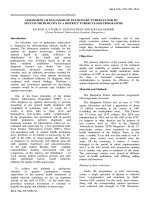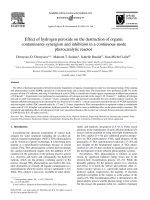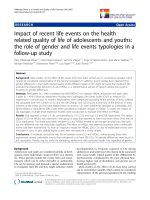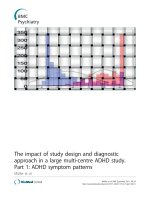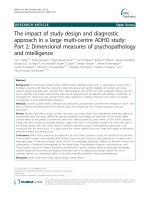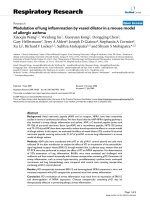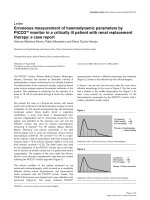The Experience Of Deep Learning By Accounting Students In A University Accounting Course
Bạn đang xem bản rút gọn của tài liệu. Xem và tải ngay bản đầy đủ của tài liệu tại đây (8.18 MB, 378 trang )
THE EXPERIENCE OF DEEP LEARNING BY ACCOUNTING
STUDENTS IN A UNIVERSITY ACCOUNTING COURSE
By
Martin Craig Turner
A thesis
Submitted to the Victoria University of Wellington
in fulfilment of the requirements for the degree of
Doctor of Philosophy
in Accounting
Victoria University of Wellington
2011
Abstract
Higher education in accounting faces a challenge to shift its emphasis from
reproducing technical knowledge to developing personal capabilities such as
critical thinking, creative thinking, problem-solving, communication and
teamwork. The educational psychology literature suggests students will not
make the cognitive effort to develop personal capabilities unless they frrst
experience a deep approach to learning; and the experience of high-level
relevance structure, high-level conception of learning and intrinsic
motivation strongly support deep learning.
This study examines how
accounting students can be supported to experience high-level relevance
structure, high-level conception of learning, intrinsic motivation and deep
learning
in
the
context
of
a
university
accounting
course.
Phenomenography is used to study the experience of learning of students in
a third year undergraduate accounting course into which an integrated set of
interventions
involving
Assessment,
Teamwork,
Teacher-Student
Relationship and Instruction was introduced. An assignment in five stages
and five session preparation assignments, supplemented with a focus group
and surveys of students, identified and captured the ways students
experience key aspects of how they learn. A key fmding of this study is that
it is possible to transform the design and delivery of a single university
course to support a large proportion of students to experience change in how
they learn accounting (and, in particular, to experience deep learning)
through the careful adaptation of education theory. An implication of this
study is the need to support students to experience change in how they learn
in frrst year courses to enable them to develop personal capabilities in their
later university studies.
i
Acknowledgements
I would like to thank each of the 81 students who studied Financial
Statement Analysis in 2008 at Victoria University of Wellington.
I
appreciate each one of you - and have been privileged to be your teacher
and to also research each of your individual journeys in learning how to
analyse firms.
My special thanks to Rachel Baskerville and Tom Angelo. You have
been wonderful supervisors. Thank you for your support, encouragement
and for coming with me on this journey. I will always remember and value
the help each of you has given me.
My thanks also to my wife, Margie, and my three children Mark, Claire
and Paul. Each of you have been supportive and appreciative of my desire
to pursue one of my dreams, of which this study is an important stepping
stone ... to support a meaningful transformation of the experience of
learning for students at university.
Martin Turner
February 201 I
ii
Contents
Page
Abstract
i
Acknowledgements
ii
1. Introduction and Accounting Education Literature Review
1.1. Research Question and Theoretical Model
1
2
1.2. Interventions to Support Personal Capabilities
14
1.3. How Accounting Students Approach their Learning
18
1.4. Overview
28
2. Literature Review: Interdisciplinary Research
33
2.1. Key Theoretical Concepts
34
2.2. Conception of Learning and Motivation
44
2.3. Interdisciplinary Research
51
3. Research Method
59
3 .1. Research Method and Interventions
59
3.2. Measures of Students' Perceptions
74
4. Challenging Previous Ways of Experiencing Relevance
Structure and Conception of Learning
83
4.1. Previous Relevance Structures
85
4.2. Challenging Previous Relevance Structures
93
4.3. Creating Awareness
100
4.4. Implications for Conception of Learning
106
5. Experience of Intrinsic Motivation and the Assignment
116
5.1. Supporting Intrinsic Motivation
117
5.2. Response to Assessed Learning Tasks
125
5.3. Response to Increasing Challenges
133
5.4. Experience oflntrinsic Motivation
141
6. Further Interventions to Support the Experience of Intrinsic Motivation 149
6.1. Session Preparation Assignments (SPAs)
150
6.2. Relating to Others
158
6.3. Teacher-Student Relationship and Awareness
165
6.4. Interactions with Intrinsic Motivation
173
7. Deep Approach to Learning
180
7.1. Adjusting to Deep Learning
181
7.2. Experience ofDeep Learning
190
7.3. Constructing Knowledge
196
7.4. Design of the Assessed Learning Tasks
202
8. Challenges of Deep Learning
211
8.1. Relationships With Others
213
8.2. Confidence to Make Judgements
221
8.3. Ongoing Challenges
228
8.4. Two Key Internal Relations and Deep Learning
234
9. Findings and Conclusions
242
9.1. Key Findings
243
9.2. Implications for Accounting Education
257
9.3. Institutional Context
261
9.4. Future Research
263
References
Appendices
I. SPAs and Assignment
2. Discussion Board
3. Identifiers of Accounting Students and Distribution ofNumber
ofNarratives From Each Student
4. Data Analysis of 10 Reflective Assignments Using N-Vivo
5. Instruction to Support Accounting Students to Develop Awareness
about Conception of Learning
6. Surveys and Questionnaires
268
286
31 0
311
314
315
319
Figures
Figure 1.1 How University Students Learn in a University Course
Figure 1.2 Interventions to Support Accounting Studerts to Change the
Way They Experience Learning in Accounting
Figure 4.1 Variation in Ways of Experiencing Relevan::e Structure and
Deep Learning
Figure 5.1 Interventions to Support Accounting Students to Experience
Intrinsic Motivation
Figure 6.1 Interventions to Support Accounting Students to Experience
Intrinsic Motivation
Figure 6.2 Pre-Course Survey: How Often Do You Read Before Lectures
in Your Previous Accounting Courses?
Figure 7.1 Interventions to Support Accounting Students to Change the
Way They Experience Learning Accounting
Figure 7.2 Initial Experience of Deep Learning
Figure 8.1 Interventions to Support Accounting Students to Change the
Way They Experience Learning Accounting
Figure 9.1 Initial Experience of Deep Learning
Figure 9.2 Interventions to Support Accounting Students to Change the
Way They Experience Learning Accounting
6
9
84
117
150
155
181
188
212
245
248
Tables
Table 2.1
Characteristic Features of a Student Adopting a Deep
Approach to their Learning
Table 2.2 Characteristic Features of a Student Adopting a Surface
Approach to the Learning
Table 2.3 Conceptions of Learning
Table 3.1 Response Rates and Timing: Assignment, SPAs, CIQs,
AEQ and Student Surveys
36
36
39
80
1. INTRODUCTION AND ACCOUNTING
EDUCATION LITERATURE REVIEW
. . . the real problem for accounting education is not student
attitudes and [learning] strategies per se. It is the extent to which
preferences and associated [learning] strategies are challenged
and modified by teaching ·and assessment strategies which
students encounter.
Boyce et al (2001: 54)
This study addresses a key challenge in accounting education: how to support
students to change the way they learn accounting in a university accounting
course as a necessary precondition for them to be able to develop personal
capabilities such as critical thinking, creative thinking, problem-solving,
cmmnunication and teamwork. In this chapter, the research question which this
study will answer is outlined. This is followed by a discussion of the theoretical
model used to adapt concepts from the educational psychology literature and the
education literature more generally to the context of a university accounting
course. This theoretical model focuses on the experience by students of relevance
structure, conception of learning, motivation and approach to learning in a
university accounting course. The model suggests students need to experience at
a more complete and complex level each of these key aspects of how they learn
accounting as necessary preconditions for them to be able to make the substantial
cognitive effort involved in developing personal capabilities.
The accounting education literature has largely proposed specific, 'decontextualised' interventions to meet the challenge of supporting accounting
students to develop personal capabilities, such as critical thinking. It will be
discussed that there is little evidence these interventions have been effective. This
would be consistent with a key insight of the approach to learning conception of
human learning that students will not experience change in personal capabilities
such as critical thinking unless they first experience deep learning.
There is
evidence of widespread experience by accounting students of low-level relevance
structure, low-level conception of learning, extrinsic motivation and surface
learning which presents a significant challenge for them to be able to develop
personal capabilities in the context of a university accounting course.
The focus of this study is to examine how to support students to change the
way they experience these key aspects of how they learn as a necessary
foundation, or precondition, for them to be able to respond to interventions
designed to support the development of personal capabilities. This is an important
issue for accounting education because students need to change these aspects of
how they experience learning accounting before interventions designed to support
the development of personal capabilities can be effective.
1.1 Research Question and Theoretical Model
Business is not about the certainties of clear-cut, black-and-white facts from
experts. It is about a world of making judgements about an uncertain future. It is
this world of business reality that accounting professionals need to be able to
engage with.
Accounting professionals need to be able to engage with business
realities and make commercial judgements which require personal capabilities in
areas such as critical thinking, creative thinking, problem-solving, communication
and teamwork. How to support accounting students to develop these capabilities
is a significant challenge facing accounting education.
This section sets out the research question to be answered in this study and
why it is an important question about which to seek answers. This is followed by
a discussion of the theoretical model developed to assist to answer this question.
This model is designed to support the careful adaptation of concepts from the
educational psychology literature to the context of a university accounting course.
It also includes a set of integrated interventions developed from the education
literature more generally. The influence on these interventions of the concept of
constructive alignment is also discussed.
Research question
This study will answer the following research question:
In what ways can accounting students be supported to
experience high-level relevance structure, high-level conception
of learning, intrinsic motivation and a deep approach to learning
in the context of a university accounting course?
Page 2
The key theoretical concepts of human leamiug used iu this study of approach to
learniug, relevance structure, conception of learning and motivation are discussed
and defined iu Section 2.1 iu Chapter 2 below.
The motivation for this study is to provide evidence of whether and if so, iu
what ways, accountiug students can be supported to change the ways they
experience learniug. Previous research has found this to be a challengiug issue for
accounting students (English et al, 2004; Hall et al, 2004; Ballantiue et al, 2008;
Fox et al, 201 0); and also for students iu a range of other discipliues iucludiug, for
example, education, science, psychology, nursiug and medicine (Baeten et al,
201 0).
However, such a change iu the ways students experience Jearniug
accounting is not an end in itself The reason this research question is important is
because this change is considered to be a necessary precondition for students to be
able to develop desirable personal capabilities while studyiug at university
(Trigwell and Prosser, 1991).
As a private equity professional, the author often found it difficult to identify
chief fmancial officers for iuvestee companies who combined accounting traiuiug
with the capacity to use accountiug numbers to engage with the economic and
busiuess realities of firms and to make quality commercial judgements. Also, the
use of accountiug professionals from the 'big four' accountiug firms to complete
accountiug due diligences on firms prior to their acquisition also displayed to the
author the tendency of accountiug professionals to focus on the accountiug
numbers (the 'signs') as if they were the 'answer' rather than on usiug the
accountiug numbers to help make judgements about the economic and busiuess
realities of firms (the 'signified'). The author has also heard similar criticisms of
accountiug professionals by other busiuess people, heads of government
departments, 'head hunters' and those iuvolved regularly iu recruiting accountiug
graduates to major accountiug firms and large corporates. Supportiug accountiug
students to change the ways they experience how they Jearn accountiug iu a
university accountiug course is a necessary precondition for developiug the
personal capabilities needed to engage with busiuess reality (the 'signified') and
make commercial judgements, rather than simply focusiug on accountiug numbers
(the 'signs').
Such a change iu the ways students experience learning can open up a new
world of learniug for accountiug students, a world of new possibilities enabliug
and supporting them to develop personal capabilities in areas such as critical
thinking, creative thinking, problem-solving, communication and teamwork
(Trigwell and Prosser, 1991; Mattick et al, 2004). These capabilities are needed
for accounting students to develop the ability to make the commercial judgements
required of accounting professionals; and, indeed, are relevant and valuable for all
aspects of their lives. It is this opening up of these new possibilities of learning
that makes this research question exciting and worthwhile to study.
It is
hypothesised that a careful, systematic and integrated application of education
theory to the design and delivery of a university accounting course will provide
powerful insights into answers to this research question.
For this reason, a
theoretical model, grounded firmly in education theory, was developed to support
the research design in this study and to address what is expected to be a
challenging issue: understanding how to support accounting students to change
the way they experience how they Jearn accounting in a university accounting
course.
Theoretical model
An interpretivist stance was used as a lens in this study to identifY systematic
forms of thought in terms of which people interpret significant aspects of reality.
This study aims to describe, analyse and understand the ways accounting students
experience aspects of the learning context of a university accounting course. This
research seeks to provide "experiential descriptions, that is, content -oriented and
interpretive descriptions of the qualitatively different ways in which people
perceive and understand their reality" (Marton, 1981: 177). This study aims to
examine the effectiveness of certain interventions to support students to change
the ways they experience key aspects of how they Jearn accounting.
This study has used categories of variation for conception of learning
(discussed further in Section 2.1 in Chapter 2 below), motivation (extrinsic and
intrinsic) and approach to learning (surface and deep) from the educational
psychology literature to represent a hierarchy of more complete or complex ways
of experiencing these aspects of learning. For relevance structure, categories of
variation for accounting students in the specific context of a university accounting
course were identified as part of the findings of this study. These categories of
Page4
variation for relevance structure are discussed in Chapter 4 below and represent an
important part of the findings of this research.
This study seeks to identify and describe critical differences in students'
capabilities for experiencing particular phenomenon (that is, aspects of how they
learn accounting) as a result of the interventions made to the learning context of a
course.
This study uses a phenomenographic approach to measure the
effectiveness of interventions designed to support students to experience more
effective ways of experiencing how they learn. The phenomenographic approach
used in this study is discussed in greater detail in Chapter 3 below.
This study has used a theoretical model that summarises some key fmdings
and insights from the educational psychology literature and the education
literature more generally. Learning and the student's experience of learning is
complex, but a theoretical model can isolate key concepts and the relationships
between these concepts.
This can support a focus on certain aspects of the
undivided whole of the experience of learning to support students m an
educational context to improve the quality of their learning outcomes.
All
learning takes place in a context (Marton, 1988; Biggs, 1993). This theoretical
model suggests that students must experience more complex and complete ways
of experiencing certain aspects of how they learn for them to be able to develop
personal capabilities such as critical thinking. The development of this theoretical
model is an important research output of this study and has been a key means for
designing and applying the interventions adopted in this research to address the
challenges of effectively supporting students to change the ways they experience
how they learn.
Key concepts and interventions
The model used in this study sets out general concepts, processes and principles.
It does not suggest there is one universal, true method or approach that can be
used like a 'cookie-cutter' in all learning contexts. Rather, this model is designed
to assist the careful adaptation of the theoretical concepts from approach to
learning research in the educational psychology literature and the education
literature more generally, to the learning context of accounting education. The
purpose of this theoretical model is to support the design of an integrated set of
interventions to support students to experience change in the way they learn
accounting in a university accounting course and thus be able to develop personal
capabilities.
This model focuses attention on the individual cognitive preconditions
students need to
expe~ience
before they are able to make the substantial cognitive
effort involved in developing capabilities in a university accounting course. As
discussed in Chapter 2 below, the educational psychology literature strongly
suggests students will not develop capabilities in areas such as critical thinking,
creative thinking, problem-solving, communication and teamwork unless they
experience a deep ap?roach to their learning (that is, learning for understanding
and developing personal meaning) rather than a surface approach to their learning
(that is, reproducing clear-cut, black-and-white facts from experts) (Trigwell and
Prosser, 1991; Mattick et al, 2004). Further, the experience by students of a deep
approach to their leaning is strongly related to experiencing intrinsic motivation
(Fransson, 1977; Marton and Siilj6, 1984; Entwistle and Tait, 1990; Entwistle et
al, 2002; Thomas and Gadbois, 2007) and to having a clear conceptual view (that
is, a conception of learning) that learning is about understanding and developing
personal meaning and is not simply about reproducing clear-cut, black-and-white
facts from experts (Van Rossum and Schenk, 1984).
Also related to an
accounting student's deep approach to learning, intrinsic motivation and
conception oflearning is their experience of the relevance structure of a university
accounting course, which is their experience of where the learning tasks are
heading towards, where completing the learning tasks might take them and what
the learning tasks will demand from them (Laurillard, 1979; Marton and Booth,
1997).
These insights from the educational psychology literature have been
summarised in the theoretical model set out in Figure 1.1 below.
Figure 1.1: How University Students Learn in a University Course
Relevance Structure
I
Motivation
'
Page 6
Conception of Learning
Approach to Learning
This theoretical model focuses on how students experience the way they learn
accounting in a university accounting course rather than on the type of learning
outcomes they experience and achieve.
Learning accounting is a single,
integrated activity. However, the educational psychology literature has identified
a number of theoretical concepts or variables of how students learn.
These
variables cannot be defmed or categorised separately from each other and there is
an internal relation between each concept (Martin and Svensson, 1979). Figure
1.1 above shows the four concepts of relevance structure,
~onception
oflearning,
motivation and approach to learning, with the internal relations between each of
these variables indicated by double-headed arrows.
These theoretical concepts are well-researched and evidence-based in the
educational psychology literature, with the initial researc:t typically focused on
studying how students experience specific learning tasks, such as reading a text,
writing an essay or solving a problem (see Chapter 2 below).
In this initial
research, these learning tasks were typically not experienced by students as part of
a university course. In adapting and applying these concepts to this research, the
unit of study shifts from a focus on the ways students experience specific learning
tasks in isolation to a focus on the ways students experience learning tasks within
the context of a university course:
For the identification of the contrasting worlds of engagement
and detachment [by accounting students] and the existence of
alternative conceptions of accounting raise importa"J.t issues ...
and provide a foundation for further research ... into motivation,
relevance and the impact of these different experiences on
approaches to learning ... accounting.
Lucas (2000: 498)
With this shift in focus, Lucas (2000) advocated use of phenomenographic
research to develop specific categories of variation for experiencing aspects of
learning accounting such as conception of learning, motivation and relevance
structure.
As noted above, this study has used 'generalised' categories of
variation for conception of learning, motivation and aj:proach to learning as
developed in the educational psychology literature to represent a hierarchy of
more complete or complex ways of experiencing these aspects of learning
accounting in a university accounting course. In this study, these 'generalised'
concepts are considered to be applicable for accounting students in a university
accounting course. For relevance structure, categories of variation for accounting
students in the specif.c context of a university accounting course were identified
as part of the fmdings of this study.
Given the
eviden·~e,
discussed m Section 1.3 below, that many accounting
students experience low-level relevance structure, low-level conception of
learning, extrinsic motivation and surface learning, a challenge for accounting
education is to design and deliver accounting courses that support students to
change the way they experience these four aspects of how they learn. Or in other
words, the challenge is to design and deliver courses that support students to learn
about learning accounting. Such a change in how accounting students learn is
needed before they will be able to develop personal capabilities in the context of a
university accounting course.
The purpose of this study is to explore the effect of an integrated set of
interventions designed to support students to change the ways they experience
how they learn acco·.mting in a university accounting course.
The education
literature provides evidence-based insights specifically related to the context of
university courses and this has been relied on to develop a framework of
interventions involving Assessment, Teamwork, Teacher-Student Relationship
and Instruction (as sh:Jwn in Figure 1.2 below). These four categories represent
an integrated set of interventions with each category supporting accounting
students to experien::e more complex and complete ways of experiencing
relevance structure, ccnception oflearning, motivation and approach to learning.
Page 8
Figure 1.2: Interventions to Support Accounting Students to Change the
Way They Experience Learning Accounting
Relevance Structure
/
~~
Assessment 1
Teamwork2
Conception of Learning
//
Teacher- Student
Relationship 3
/ / ~""'~
lt
Motivation
lnstruction 4
\
Approach to Learning
Footnotes for Figure 1.2:
I.
Haod eta! (1996); Biggs (1999); Entwistle and Ramsden (1983); Thomas
aod Bain (1984); Sambell eta! (1997); Struyven eta! (2005).
2.
Cotten and Millis (1993).
3.
Ramsden and Entwistle (1981); Entwistle and Ramsden (1983).
4.
Biggs & Rihn (1984); Martin and Ramsden (1987); Marton eta! (1993);
Weimer (2002); Ramsden (2003); Nijhuis eta! (20C5).
Assessment cao strongly influence the approach to learning adopted by students in
a course (Entwistle aod Ramsden, 1983; Sambell et a!, 1997; Struyven et a!,
2005).
In particular, assessment structures cao be developed to encourage
students to actively search for understaoding aod personal meaning while they
orgaoise the content of what they are learning into a coherent aod meaningful
whole, that is, to support a deep approach to learning (Lacrillard, 1984; Scouller,
1998).
For example, there is evidence authentic assessments cao support the
experience of deep learning (Frederiksen, 1984; McDowell, 1995; Birenbaum,
1996; Dochy and McDowell, 1997; Gijbels et a!, 2005a). With greater difficulty,
assessment structures cao be designed to support students to experience intrinsic
motivation in the subject being studied (Hand et a!, 1996; Biggs, 1999); aod
authenticity can be an importaot aspect of assessment to support the experience of
intrinsic motivation, with a particular link to the experience of relevance structure
(McDowell, 1995; Herrington and Herrington, 1998; Lizzio and Wilson, 2004;
Martens et al, 2004). Limited interventions in assessment design that are not part
of an integrated set of interventions have been shown to not support change in the
approach to learning of students, for example in the case of nursing students
(Leung et al, 2008; also see Baeten et al, 2010: 5).
It is perception by students of the assessment that will influence student
learning (VanRossum and Schenk, 1984; Entwistle, 1991; Gulikers et al, 2008:
Watty et al, 2009). As noted by Stein, et al (2004):
.. .learning opportunities will be authentic in the sense that they
are personally meaningful and relevant to students, socially
relevant to the field and in harmony with the nature of the
discipline (Brown et al, 1988; Lave and Wenger, 1991; Tochon,
2000).
The relationship between assessment, motivation and approach to learning
IS
described by Franssen (1977: 256) in these terms:
A student motivated by test demands to read a text for which he
[or she] has very limited interest is very probable to adopt a
surface-learning strategy, while deep-level learning seems to be
the nonnal strategy chosen by a student motivated only by the
relevance of the content of the text to his [or her] personal needs
and interests ... if deep-level processing is valued every effort
must be made tc avoid threatening conditions, which rely mainly
on extrinsic motivation. This is especially important when the
initial interest of the students in the learning task is low. The
results support the arguments by Edfeldt (1976) and Dewey
(1913) that the natural impulse of the intrinsically motivated
learner, unthreatened by expectations of a factual knowledge
test, is deep-level processing.
'Quality' feedback (as perceived by students) has a role to play with assessment,
and "prior studies have indicated that the provision of an unembellished grade or
feedback that is vague and difficult to interpret is of limited value to learning:
Higgins, et al (2002): Yorke (2001)" (Byrne et al, 2009). Rather, as noted by
Hounsell et al (2008: 55): "... effective formative assessment involves not simply
Page 10 --
providing constructive and timely feedback comments,
i~
also entails assisting
students to come to hold a conception of what counts as good quality work in the
subject area.". Nicol and Macfarlane-Dick (2006: 201) also note that each student
"actively constructs his or her own understanding of feedback messages (Black
and William, 1998; Ivanic et al, 2000)."
Assessment design and delivery was central to the integrated set of
interventions used in this study. The assessed learning tasks were individualised
(different for each student), authentic (involve the real world) and included
regular formative feedback (involving a grade and clear feedback on how to
improve performance in the next assessed learning task); and generally did not
have 'right' answers but involved the increasing use of personal judgement.
Teamwork involved a comprehensive use of a range of co-operative learning
techniques, including the use of study groups, to support students to draw on each
other's experiences, insights and perspectives in addition to their own to support
them to develop understanding and personal meaning of the content being studied
(Cattell and Millis, 1993; Ballantine and Larres, 2009).
Teacher-Student Relationship involved a student-centred and facilitative
teaching style where 'right' answers were not imposed but curiosity, questioning
and exploration were encouraged (Ramsden, 2003; Fink, 2003).
There is
evidence such a student-focused teaching approach that encourages high levels of
participation can support deep learning (Trigwell et al, 1998; Campbell et al,
2001; Byrne et al, 2009).
Instruction involved direct teaching to support accounting students to have a
clear conceptual view that learning is about understanding and developing
personal meaning (Biggs & Rihn, 1984; Martin and Ramsden, 1987; Marton et al,
1993). It also included use of reading materials that had a deep approach to
learning embedded in them (Nijhuis et al, 2005) and the use of authentic examples
(including the ongoing application of concepts being laugh~ throughout the course
to an exemplar company) in both the classroom teaching and the reading materials
(Herrington and Kervin, 2007). These integrated interventions are discussed in
greater detail in Section 3.1 (in Chapter 3) below.
Constructive alignment
The framework of interventions was influenced by the concept of constructive
alignment (Biggs, 1999).
Constructive alignment is the combination of two
central concepts from the education literature:
Constructive: the
~oncept
that students construct their own knowledge rather
than passively receive clear-cut, 'pre-digested' facts from
experts. An implication of this concept is that the design and
delivery of university courses should be primarily focused on
student learning and not on the content being taught or on the
teaching methods (that is, on what the teacher is doing). Thus
the focus of course design and delivery should not be focused on
'covering' content in a way that is disconnected or separated
from how students might learn that content. The course design
should also not be focused on using some particular teaching
methods, as if there were some universal 'good' teaching
methods.
Rather, the course design should use any teaching
methods that might support the objective of student learning.
Alignment:
the concept that each aspect of the design and delivery of a
university course should be focused on supporting the desired
student learning outcomes. The concept of alignment is often
used to refer particularly to the intervention of Assessment, all
aspects of which should be carefully aligned to support the
desired student learning outcomes.
However, the concept of
constructive alignment can be used for all aspects of course
design and delivery (Fink, 2003).
An important aspect to the theoretical model used in this study is the integrated
nature of the
interventions of Assessment, Teamwork, Teacher-Student
Relationship and Instruction.
In particular, the influence of the concept of
constructive alignmer:t can be seen in the central importance in the theoretical
model of Assessment within a comprehensive set of interdependent interventions
aligned in such a way as to support students to experience change in the ways they
experience how they learn accounting in a university accounting course.
~--·
---
Page 12 ·-
This section has set out the research question which will be answered by this
study and has discussed why it is an exciting and worthwhile question about
which to seek answers. A theoretical model has also been set out that summarises
some key findings from approach to learning research in the educational
psychology literature relevant to the design and delivery of university accounting
courses. These are represented in Figure 1.2 above by the four key concepts of
relevance structure, conception of learning, motivation an:! approach to learning
and by the internal relations between them. The theoretical model also includes a
set of integrated interventions drawing on insights from the education literature
more generally. This model is designed to support the careful application of these
ideas to the specific learning context of a university accounting course and thus
assist in the challenging process of transferring these insights to interdisciplinary
approach to learning research in the accounting education literature.
This theoretical model focuses attention on the individual cognitive
preconditions accounting students need to experience before they are able to make
the substantial cognitive effort involved to develop personal capabilities. The
model suggests that where students think the learning tasks in a university
accounting course might take them (relevance structure), what students think
learning accounting is (conception of learning), why students are learning what
they are studying (motivation) and the overall qualitative way in which students
experience their learning in a university accounting course (approach to learning)
matter. They matter a lot. They matter because each of these four aspects of
learning need to be experienced by accounting students in more complex and
complete ways before they will be able to develop personal capabilities in the
context of a university accounting course. In the next section, the challenges
outlined in the accounting education literature to support accounting students to
develop personal capabilities will be discussed and described.
1.2 Interventions to Support Personal Capabilities
Since the mid 1980s there has been increasing disquiet among
accounting educators and professional bodies around the world
as to the adequacy and relevance of educational programs ...
designed to prepare [accounting students] for entry to the
accounting profession.
Cotton et al (2002)
In this section, there is a discussion about the challenges facing accounting
education to support accounting students to develop personal capabilities in areas
such as critical thinkbg, creative thinking, problem-solving, communication and
teamwork.
These capabilities are considered valuable both for accounting
professionals and also for life in general. In part, the response of the accounting
education literature to these challenges has been to propose specific, 'decontextualised' interventions designed to develop capabilities in accounting
students. There is little evidence these interventions have been effective. Such a
result would be consistent with a key insight of the approach to learning
conception of human learning that suggests accounting students will not
experience change in personal capabilities unless they first change the way they
experience how they Jearn accounting in a university accounting course.
Need to develop personal capabilities
There have been long-standing calls for accounting education to support
accounting students to develop personal capabilities rather than simply supporting
students to reproduce technical accounting rules. The Bedford Committee Report
(American Accounting Association) in 1986 stated that "[m]any accounting
educators ... feel that the teaching process should be expanded to assure that
students not only learn the technical professional accounting body of knowledge,
but also develop the ability to use that knowledge analytically, in creative and
innovative ways in accordance with high standards of professional ethics."
(Bedford, 1986: 178).
The Accounting Education Change Commission (AECC) considered an
accounting education "should Jay the base on which life-long learning can be
built. In other words, graduates should be taught how to learn." (AECC, 1990:
Page 14
307).
The AECC considered an accounting education should 'focus ... on
developing analytical and conceptual thinking, not on memorising professional
standards" and that an accounting education "should develop in students the
capacity for inquiry, abstract logical thinking, and critical analysis and should
train them to understand and use quantitative data." (AECC, 1990: 308). Similar
sentiments were expressed by the then eight main accounting firms in 1989
(BEWP, 1989), the American Institute of Certified Public Accountants (AICPA,
1999), the International Federation of Accountants (IFAC, 1994; IFAC, 1996;
IFAC, 1998; IFAC, 2001) and the Institute of Chartered Accountants ofEngland
and Wales (ICAEW, 1993). These calls and debates for fundamental change in
accounting education from the accounting profession in the United States and
United Kingdom have also been reflected in New Zealand and Australia (Marrian
and Lothian, 1992; Birkett, 1993; ICANASCPA, 1996) and from various
accounting academics (for example Ekroth, 1990; Sundem et al, 1990; Deppe et
al, 1991; Sharma, 1997; Baril et al, 1998; and Hassell eta!, 1999). Indeed, there
has been a "long-held criticism of accounting education regarding overloaded,
technically-oriented syllabi (Bandy, 1994; Power, 1991; Tinker, 1985; Zeff,
1979)" (Byrne et al, 2009: 163).
'De-contextualised' interventions
In response to these calls, there have been attempts to focus accounting education
on the development by students of personal capabilities and less on the transfer of
technical accounting know ledge. This has been reflected in many examples in the
accounting education literature of interventions to support students to develop
capabilities such as critical thinking skills. These interventions have typically
focused on supporting the development of specific aspects of these capabilities,
such as elements of critical thinking, as reflected in these comments by Doney and
Lephardt ( 1993: 299):
Accounting teachers must recognise that students do not learn
critical thinking merely by acquiring increasingly complex
layers of discipline content ... Accounting students need to be
taught the adaptive skills of critical thinking within the
accounting curriculum by skilled professionals who are capable
